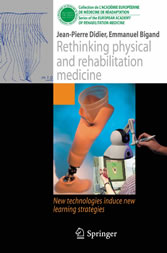Suchen und Finden

Rethinking physical and rehabilitation medicine - New technologies induce new learning strategies
Mehr zum Inhalt

Rethinking physical and rehabilitation medicine - New technologies induce new learning strategies
'Re-education' consists in training people injured either by illness or the vagaries of life to achieve the best functionality now possible for them. Strangely, the subject is not taught in the normal educational curricula of the relevant professions. It thus tends to be developed anew with each patient, without recourse to knowledge of what such training, or assistance in such training, might be.
New paradigms of re-education are in fact possible today, thanks to advances in cognitive science, and new technologies such as virtual reality and robotics. They lead to the re-thinking of the procedures of physical medicine, as well as of re-education.
The first part looks anew at re-education in the context of both international classifications of functionality, handicap and health, and the concept of normality. The second part highlights the function of implicit memory in re-education. And the last part shows the integration of new cognition technologies in the new paradigms of re-education.
Alle Preise verstehen sich inklusive der gesetzlichen MwSt.


















